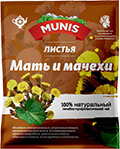Tea Munis «Coltsfoot»
BASIC PROPERTIES
It is used as an expectorant, anti-inflammatory, antimicrobial, antipyretic, wound healing, tonic remedies for inflammatory diseases of the kidneys and bladder, respiratory organs and gastrointestinal tract. Topical application in inflammatory processes of the oral cavity and skin diseases.
DETAILED DESCRIPTION
Composition of Coltsfoot:
Green tea, Coltsfoot leaves.
Characteristic:
The chemical composition of the leaves of the coltsfoot contains tartaric, malic and ascorbic acids, tannin, rutin, mucous and tannins, bitterness, essential oil and phytosterols, mineral salts.
Beneficial features:
The leaves of the coltsfoot are widely used as an expectorant, disinfectant, antipyretic and, of course, anti-inflammatory agents, in almost all diseases of the upper respiratory tract.
The coltsfoot contains a large amount of mucus, which has an enveloping effect on the mucous membrane of the human mouth, as well as the throat and larynx, and helps protect against irritation. In addition to mucus, this plant contains saponins, as well as organic acids, which help soften and thin sputum in the upper respiratory tract. Tannins in the leaves of the mother and stepmother have a clearly directed effect on the elimination of inflammatory processes, reduce hyperemia of the mucous membranes.
Also, an infusion of coltsfoot leaves is used for diseases of the gastrointestinal tract as an astringent.
Herbal tea mother and stepmother recommended:
In the form of an infusion of leaves, coltsfoot is used:
- for chronic bronchitis, smoker's bronchitis, influenza and runny nose;
- for the treatment of allergies and bronchial asthma;
- for cystitis, urethritis and pyelonephritis;
- for the treatment of gastritis and peptic ulcer disease;
- for hypertension;
- for disorders of the nervous system;
- for joint and muscle pain.
For external use:
- rinses for toothache, stomatitis, inflammation of the gums;
- for skin diseases, boils, mastitis, burns;
- for dandruff and hair loss.
 |
Release form: Method of preparation Recommendations for use |
Expiry date:
According to the indicators.
Exceptions:
- pregnancy and breastfeeding;
- women in case of permanent delay of the menstrual cycle;
- liver disease — hepatitis, cirrhosis;
- individual intolerance.
Expiration date:
In a dry and cool place, within 2 years.
